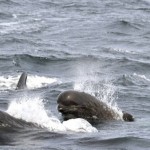AFTER 125 PILOT WHALES DIE IN FAROE ISLANDS, NEWS FROM EARTHRACE THAT HUNTERS WILL NEED ‘LICENCE TO KILL’ FROM 2015
The first grind of the year has taken place in the Faroe Islands. A total of 125 pilot whales were killed last week (Monday 22 July) after the pod was spotted the previous evening and driven into the bay of Viðvík, one of the 23 allowable grind bays according to government regulations.
However, the grind comes hot on the heels of an announcement by the Minister of Fisheries on the Faroe Islands, Jacob Vestergaard, that as from 1st May 2015, all those taking part in the Faroe Island’s whale hunts must participate in a course in the laws and correct procedures relating to the grinds, and possess the relevant pass certificate.
It is proposed that training will be given in the use of the only grind tools that will be permitted as of 2015 (nostril hooks and spinal lances), the ability to recognise death signals of the prey, and being cognisant of all legislation before they can participate.
Use of the grindknife will no longer be allowed except in special circumstances, similarly use of the the grinding hook (sóknarongul) will also only be allowed under special circumstances by permit from the foreman of the grind or the local police chief. The Pilot Whalers’ Association has already agreed with most the changes proposed.
Runi Nielsen, who represents marine conservation organisation, Earthrace, said from his home on the Faroe Islands, “A large majority of the participants in the grinds who at the moment just show up and take part, will not bother to take these mandatory courses and by doing so will exclude themselves. The fewer people taking part, the less a part of the Faroese way of life the grinds will become”.
Nielsen believes the new legislation is being put forward to prevent any possible repetition of one of the worst and most condemned grinds in Faroese history that took place in 2010.
“Inexperience, a lack of authority and direction, the unsuitable location and the sheer number of pilot whales targeted led to the deaths of 228 pilot whales in completely unacceptable circumstances that shocked even Faroese supporters of the grinds,” Nielsen says.
One issue that continues to concern Nielsen is the level of anger directed at all Faroese by those who believe rage and antagonism will stop the grinds. He says, “There are almost 50,000 people living on the Faroe Islands and only a very small percentage of them take part in, or are involved in any way, in the grinds.
“There is a growing movement from within the Faroes that wants to see the grinds stop, but the way forward is dialogue not unfair criticism of all of us – that just gets everyone’s Viking blood boiling and is counter-productive.
“People like Pete Bethune(founder of Earthrace Conservation) and Ric O’Barry, who helped focus the world’s attention on the dolphin drives in Taiji, Japan, have made the effort to visit the Faroe Islands and talk to people sensibly on both sides regardless of their personal feelings about what happens here. As a result, they have a much better level of understanding of the psyche behind the grinds which in turn is leading to more thoughtful and better planned campaigning against them.
Nielsen concludes, “The announcement of the changes to how grinds will operate in the future in the Faroe Islands is a welcome one. In Newfoundland in the 1960’s, similar new rules were issued. The first grind that took place under their new rules was also the last grind to ever happen there. This may not be a direct move towards ending the grinds in the Faroe Islands yet, but it does, I believe, mark the beginning of the end”.
